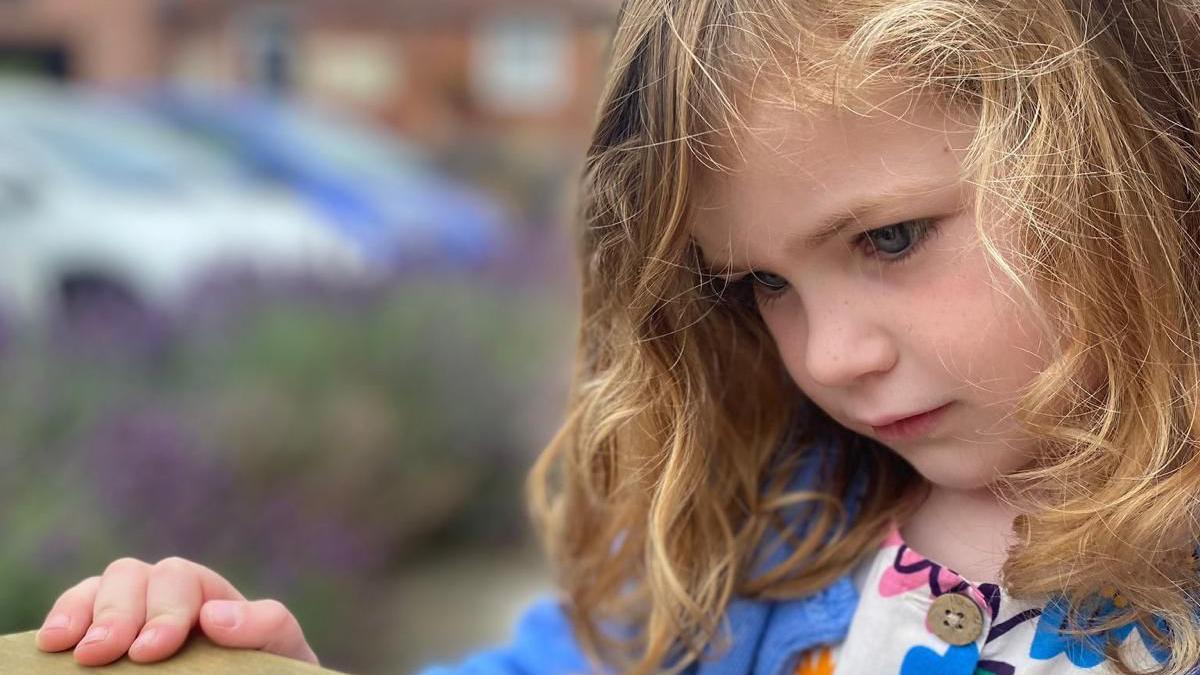Mother 'petrified' over cystic fibrosis drug access

Sarah says she is "heartbroken" for her daughter who may not be able to access a life-extending drug
- Published
A mother said her daughter's future has been "ripped away " after the National Institute for Health and Care Excellence (NICE) , externalwithdrew its recommendation for a number of drugs to treat cystic fibrosis (CF).
Sarah's four-year-old daughter Lucy has the condition and her family believed she would be eligible for the drug Kaftrio at the age of six.
However, NICE's draft guidance said it would not recommend three treatments, including Kaftrio, for new patients.
In a statement, it said it had been "evaluating the cost-effectiveness" of "these effective medicines" and a consultation with stakeholders would help it reach its final decision.
Sarah, who lives in Wingham, Kent, said: "I am utterly heartbroken right now, I have always been scared and worried about my Lucy’s future due to her CF, but now I am petrified.
"It feels like a lifeline that was being handed to 90% of the CF community has just been ripped away. To hear the news that she won’t be receiving Kaftrio ever is horrendous."
Sarah described the decision of health bosses as "incomprehensible".
Children with CF have a shortened life expectancy.

Lucy's family say it's "horrific" that she may be not be eligible for the "miracle" drug
The draft guidance from NICE is open for consultation until 24 November.
It would not affect those who already take Kaftrio or Symkevi, which are currently recommended for patients aged six and over, or Orkambi, which can be used at age one and over.
If passed, young children or babies who are yet to receive these therapies would not be guaranteed them under NHS care, despite NICE's view there are major benefits.
Cystic fibrosis , externalis an inherited condition that causes sticky mucus to build up in the lungs and digestive system. This causes lung infections and problems with digesting food.
In the UK, most cases are picked up at birth using a newborn screening heel prick test.
Symptoms present in childhood and worsen over time, with the lungs and digestive system becoming increasingly damaged.
David Ramsden, CEO of Cystic Fibrosis Trust said it was “disappointing news” which “creates uncertainty” for those not yet on treatment.
He said urgent work was needed to find a way to make the drugs available to anyone who might benefit.
“We must never return to a situation where people with CF die far too young, knowing there’s a treatment that could change that," he said.
In a statement, Helen Knight, director of medicines evaluation at NICE, said it was "evaluating the cost-effectiveness" of the drugs "to ensure that taxpayers continue to get value for money".
She said NICE wanted to hear from stakeholders through consultation "to ensure we have all the relevant information to accurately capture the value of these effective medicines when the committee makes its final decision".
The Department of Health has also been approached for a comment.
Follow BBC South East on Facebook, external, on X, external, and on Instagram, external. Send your story ideas to southeasttoday@bbc.co.uk, external.